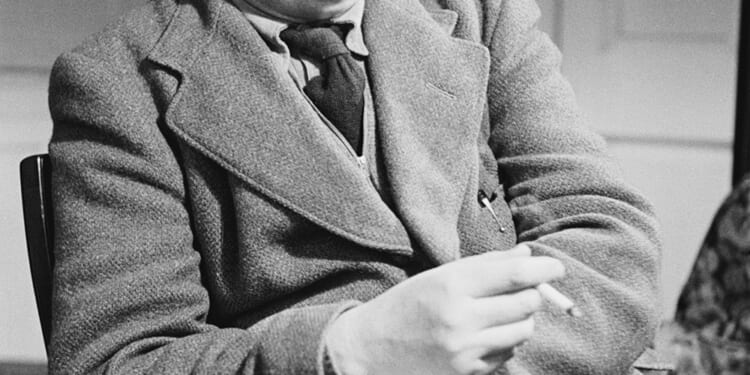
This Fall marks the 75th anniversary of the publication of C. S. Lewis’ classic novel The Lion, The Witch and the Wardrobe. According to Dimensions Guide, this title alone has sold over 85 million copies.
Publisher HarperCollins says the entire Narnia series has sold over 115 million copies, making Aslan one of the greatest literary characters of all time. Overall, Lewis’ books have sold over 200 million copies (according to Wordsrated), with around 2 million books sold each year.
Let that sink in. Because this week marks the 62nd anniversary of his death (Nov. 23) and once again reminds us of the enduring appeal of Clive Staples Lewis (1898-1963).
His day job was as an academic, as a fellow and tutor of English literature at Oxford University, and later as a professor of Medieval Renaissance Literature at Cambridge University. But it’s what he did in his off-hours that set him apart. Lewis wrote. While maintaining a full academic load, he had a disciplined daily writing routine, living simply, avoiding distractions, and rising early. He did most of his writing before breakfast in the early morning hours. He wrote by hand, and he wrote quickly with little revision.
While teaching at Oxford, Lewis made a well-known spiritual journey from atheism to faith in Jesus Christ. Despite pressure from his Magdalen College colleagues, he would not keep his faith to himself. He had to explain it to others and, in so doing, became one of the most popular defenders of orthodox Christianity in the English-speaking world.
I suspect many of my readers would be quick to name him as a spiritual influence, as would I. But why? What is so compelling about C.S. Lewis? This fall, I am teaching a college class on Lewis’ life and writings.
Here are five reasons why students still find him appealing.
First, he wore many literary hats. Think of it. John Bunyan was known for his allegory, Shakespeare for his plays, and Spenser for his poetry. But Lewis did what few could. He was able to cross literary genres. As Peter Kreeft puts it:
“Before his death in 1963 he found time to produce some 60 first quality works of literary history, literary criticism, theology, philosophy, autobiography, Biblical studies, historical philology, fantasy, science fiction, poems, sermons, letters, formal and informal essays, a historical novel, a spiritual diary, religious allegory, short stories, and children’s novels. Clive Staples Lewis was not a man: he was a world.”
Lewis also inspired others to write, particularly J.R.R. Tolkien, who said that without Lewis, The Lord of the Rings might never have been written.
Second, in his writing, C.S. Lewis employed a combination of reason and imagination. Some refer to him as a romantic rationalist.
On the one hand, Lewis was part of the romantic resurgence after the two world wars, which rejected materialism, nihilism and scientism and affirmed not just emotion but imagination and longing. But for Lewis, romanticism was not enough. He said that our longings suggest that the human soul was made for more than this world.
Conversely, Lewis was also a rationalist. He affirms reason, logic and objective value. And yet, for him, reason alone was not enough. He believed that reason and logic are rooted in the rationality of God. What held his romantic and rational sides together was Christianity, which made room for both.
Third, Lewis could explain the Christian faith in a way that made sense to a wide range of people. Unlike some of the academic theologians around him, he could translate theology into the vernacular. He avoided jargon and excelled at explaining difficult ideas. He had the remarkable ability to engage a wider audience, which included Oxford undergraduates, RAF mechanics and children. In so doing, Lewis advocated for “mere Christianity” (what all Christians believe) and made an intelligent yet understandable defense of this faith. As he wrote in Mere Christianity:
“God made us: invented us as a man invents an engine. A car is made to run on petrol, and it would not run properly on anything else. Now God designed the human machine to run on himself. He himself is the fuel our spirits were designed to feed on. There is no other. That is why it is just no good asking God to make us happy in our own way without bothering about religion. God cannot give us a happiness and peace apart from himself because it is not there. There is no such thing.”
Fourth, C.S. Lewis helped explain the crisis of the late modern world. He has been called a 20th-century prophet because he saw things ahead of time that others did not see. He saw two great worldviews in collision — naturalism and supernaturalism. He saw that relativism, subjectivism and a radical egalitarianism were eroding the moral foundations of the Western world. He saw the cultural darkness that emerges when a nation abandons objective value (goodness, beauty and truth). He even foresaw the emergence of a coming soft despotism in the West.
Finally, many of C.S. Lewis’ writings are characterized by the pursuit of joy. Some have likened Lewis to Augustine himself, who went on a joy quest and only found a cure for his restlessness and longing in the living God. Ultimately, he believed that the joy we long for is found beyond this world. “Joy” he said, “is the serious business of Heaven.” The things of this world are not enough to satisfy. “Aim at heaven and you will get Earth thrown in. Aim at earth and you will get neither.”
If you find yourself wanting to go deeper with C.S. Lewis, you might dig into one of his biographies. My favorite remains Jack: A Life of C.S. Lewis by George Sayer. If you are wondering which book by C.S. Lewis to read, start with The Chronicles of Narnia,Mere Christianity, or The Screwtape Letters.
Why read C.S. Lewis? Not only because there is an enduring quality to what he writes. But also because reading Lewis enlarges us. It will enlarge your mind, your imagination, and even your view of who God is. It enlarges us by holding out the prospect of eternal joy.
Dr. Donald Sweeting is a noted educator, minister and author. He recently served as president and chancellor of Colorado Christian University. Previously he served as the president of Reformed Theological Seminary in Orlando, Florida, and prior to that he served as a pastor for 22 years. He holds a BA from Lawrence University, BA and MA degrees from Oxford University, and a Ph.D. from Trinity International University. He is the author of several books. His writings have been widely published by Townhall, Fox News, The Washington Times, The Jerusalem Post, and many other outlets. Dr. Sweeting and Christina have three adult sons and a daughter. He regularly posts his thoughts at donsweeting.com and can be followed on Twitter @dsweeting.

















